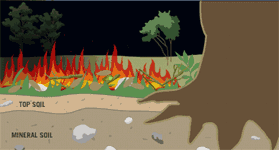Home >>> Local History >> Fire Ecology
Fire Ecology
Fires have always been an important ecosystem process throughout the southeast region, including Florida. Several natural communities are dependent on fire to remain healthy. These natural communities, such as scrub and pine flatwoods, and the many animal species that use them, depend on fire for their continued existance. The climate in Florida promotes fire through seasonal dry periods and lightning-induced fires. Historically, Florida landscapes have relatively short fire cycles, burning every 3 to 7 years. These short cycles are possible because the high rainfall and long growing seasons that favor rapid vegetation growth. The ecosystems would burn readily and recover quickly.
Fire is important for the survival of many plants and animals. For example, the gopher tortoise requires periodic fire to maintain it's habitat quality. Some pine trees like the Ocala sand pine (Pinus clausa var. clausa) has come which remain closed until fire sweeps through. Fire also promotes flower, seed, and fruit production in many plants, providing food for wildlife.
History of fire suppression
Natural fire suppression in Florida began in the 1930's to protect forests for lumber.As the occurrence of natural and prescribed fired decreased, the chance of catastrophic wildfire increased. During this period, people became predisposed to the idea that all forest fires are bad without understanding the history of fire ecology in our natural communities.
Fire as a management tool
 Natural
and prescribed fires reduce fuel build-up before it accumulates in large
quantities, making wildfires less damaging. Fuel that is left to accumulate
on the forest floor can result in an inferno. Fire actually restores and
maintains natural habitat conditions. In the absence of fire, species
that depend on fire to suppress their competitors are replaced by more
deciduous communities. For example, a pine flatwood would convert to a hardwood forest. Fire creates dramatic changes
in the landscape, influences wildlife populations, and is the best wildfire
insurance.
Natural
and prescribed fires reduce fuel build-up before it accumulates in large
quantities, making wildfires less damaging. Fuel that is left to accumulate
on the forest floor can result in an inferno. Fire actually restores and
maintains natural habitat conditions. In the absence of fire, species
that depend on fire to suppress their competitors are replaced by more
deciduous communities. For example, a pine flatwood would convert to a hardwood forest. Fire creates dramatic changes
in the landscape, influences wildlife populations, and is the best wildfire
insurance.
Learn about the Anatomy of A Prescribed Burn.
Fire and you
Today's challenge is balancing land management and public safety. Prescribes fire is a necessary and valuable tool but it also raises liability issues concerning smoke and the loss of structures in areas of fire.
In areas around Madera , prescribed burns can be used to maintain a natural healthy community. Burning these areas decreases the chances of a larger fire occuring. Prescribed burns reduce fuel loads and help prevent the spread of fire into residential ares. Keep in mind that prescribed fire is one of several management tools used to keep the land healthy and will become impractical as nearby areas develop.
If your home is near the edge
of a forest, there are measures you can take to protect yourself and
your home. For more information, read how Fire-safe
Landscaping Can Save Your Home.

